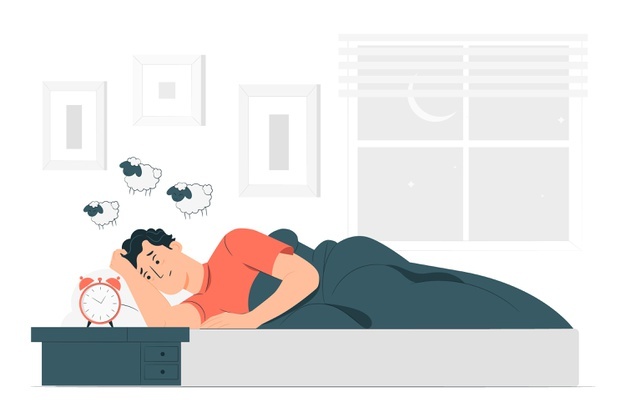Online Sleep | Insomnia Therapy | Best Therapist For Insomnia Help
- Set up a free & confidential chat on your Sleep | insomnia therapy
- Unlimited help through Sleep | insomnia therapy self-care app
- Live Video or Chat sessions with top Sleep | insomnia therapists
Begin Therapy
Consult online with best Therapist
Get the best help for Insomnia
TherapyMantra is here to help you on your path to recovery from insomnia. We match you with the best Sleep | insomnia therapists available 24/7 via video call or messages.
Match with Sleep | insomnia Therapists
We assign the best counselors experienced in Sleep | insomnia therapy based on your needs.
Affordable and Effective
Our online sessions are 90% less expensive than in-person therapy, available 24/7.
Self-Care for Sleep | Insomnia Therapy
We offer ongoing Sleep | insomnia therapy support through self-care tools, Sleep | insomnia therapy help videos, chat groups, meditations, breathing exercises, and other resources.

Wondering if it’s just a phase or something more? Take our Free online Sleep | insomnia therapy test to find out?
How it works?
You are matched with a Sleep | insomnia counselor based on your needs and preferences. You get a secure “therapy room” where you can communicate with your counselor via chat or phone. You can write or talk about Sleep | insomnia therapy & ask questions to deal with insomnia.

Register for Sleep | Insomnia therapy
Simply complete a 5-minute online form to tell us about your insomnia.

Consult with your Sleep | insomnia Therapist
We connect you with Sleep | insomnia therapy counselors who are available 24/7 based on your preferences and needs.

Connect to Our App
Apart from Video/chat sessions, our app offers self-care tools, videos, and meditations to help you deal with your Sleep | insomnia.
Best Sleep | insomnia Counselors
Positive conversations, exercises, and meditations are used by TherapyMantra psychologists to help you deal with Sleep problems | insomnia. Our Sleep | insomnia therapists outperform traditional counseling as you get matched from a pool of 500+ Sleep | insomnia counselors, who offer 24/7 unrestricted private chat.








What Is Insomnia?
Insomnia is one of the most common sleep disorders. It’s characterized by difficulties falling asleep, excess daytime sleepiness, and nighttime wakefulness. Up to 30% of the population suffers from insomnia at some point in their lives.
There are a number of things that can cause insomnia, including stress, anxiety, depression, medications, and health conditions.
Insomnia symptoms include Tiredness and drowsiness during the day, difficulty concentrating, difficulty falling asleep at night despite feeling very tired after a long day, Often waking up during the night and having difficulty going back to sleep. Waking up too early in the morning, often before it is time to wake up (early awakening). You may be more likely to experience insomnia as you age.
Types of Sleep Insomnia
There are several types of insomnia:
- Primary insomnia– This type of insomnia is not caused by any other physical or mental health condition.
- Secondary insomnia– This type is caused by another physical or mental health condition.
- Psychophysiological insomnia- This type is caused by stress and anxiety about not being able to fall asleep or stay asleep.
- Behavioral insomnia of childhood– This type is caused by bad sleep habits or routines, such as watching television or using electronic devices in bed.
- Paradoxical insomnia– This type is the opposite of psychophysiological insomnia, and is caused by too much worry and anxiety about not being able to fall asleep.
- Idiopathic insomnia– This type of insomnia has an unknown cause.
Treatment Options For Insomnia
Insomnia can be treated by the following-
Therapy
Counseling is the most common treatment for insomnia. There are many types of therapy available to those suffering from insomnia. Cognitive therapies focus on providing assistance with sleep through restructuring negative thought processes about sleep. Relaxation and behavioral therapies modify your behavior and daily routine in order to facilitate a healthy environment for better sleep.
Medication
If other treatments for insomnia don’t work, your doctor may prescribe medications to treat the condition. There are several types of sleep medication that can be prescribed for short or long-term use including:Short-term: zolpidem (Ambien) and eszopiclone (Lunesta), Long term: clonazepam (Klonopin), zolpidem, eszopiclone.
Meditation
Meditation is another alternative treatment option for insomnia. The meditation techniques usually combine body relaxation, breathing exercises, and guided imagery.
Alternative Therapies
Alternative therapies are an effective non-medication way to treat insomnia. Some of the most popular alternative therapies include acupuncture, acupressure, aromatherapy, craniosacral therapy, and massage.
Herbal Supplementation
Herbal supplements are commonly used to treat insomnia due to their ability to induce sleep. However, herbal supplementation should never take the place of your prescribed medication without first consulting with your doctor.
Exercise & Diet
Exercise and diet are lifestyle changes that can help improve sleep. Exercising regularly helps promote better sleep due to the release of endorphins during activity, which induces relaxation. Eating a healthy diet is also important in maintaining consistent sleeping habits because specific foods can cause either lethargy or hyperactivity after being consumed.
Sleep Hygiene
Sleep hygiene is a collection of habits and routines that aim to improve sleep. It’s important to create a relaxing environment before going to sleep by dimming lights, turning off alarms and electronics, and ensuring the room temperature is comfortable. Additionally, avoid eating too much or eating right before bed as well as refraining from drinking caffeinated beverages in the evening. Establish a regular sleep schedule and avoid napping during the day. lastly, limit stress by practicing some form of relaxation technique such as yoga or meditation.
How can therapy help with Sleep Insomnia?
Sleep therapy is a form of treatment that is used to help people who have difficulty sleeping. It can be used to help people fall asleep, stay asleep, or get back to sleep after waking up. Sleep therapy includes techniques like relaxation exercises, cognitive therapy, and sleep hygiene education.
Sleep therapy can be an effective treatment for insomnia (trouble falling asleep), but it should not be used to replace other forms of treatment. Sleep therapy can be used along with counseling and medication in order to provide the best possible results.
Therapy options for Insomnia
There are a number of therapy options for insomnia, including cognitive-behavioral therapy (CBT), stimulus control therapy, sleep restriction therapy, and relaxation therapy.
Cognitive-behavioral therapy
Cognitive-behavioral therapy is a type of therapy that focuses on the thoughts and beliefs that contribute to insomnia. It helps people learn how to identify and change these thoughts and beliefs. Stimulus control therapy is a type of CBT that focuses on getting rid of factors that keep people from sleeping. This includes avoiding caffeine, watching TV in bed, working in bed, and using the bed for anything other than sleep or sex.
Sleep restriction therapy
Sleep restriction therapy is a type of CBT that limits the amount of time people spend in bed. This helps them to get more restful sleep. People usually start with 7-8 hours of total sleep per night and then adjust the amount of time in bed as needed.
Relaxation therapy
Relaxation therapy is a type of CBT that helps people learn how to relax their minds and body. This can help them fall asleep and stay asleep. Relaxation therapy may include yoga, meditation, or deep breathing exercises.
Insomnia can be a very frustrating sleep disorder to deal with. However, these therapy options available can help.
How to find an insomnia therapist?
TherapyMantra can help you find a Sleep insomnia therapist near you. We have over 500+ therapists listed on our therapist directory. You can follow the following steps to find a good insomnia therapist:
- First, ask your family doctor or anyone else you are seeing for a referral for an insomnia therapist.
- The next thing you’ll want to do is ask your friends and loved ones for referrals.
- The next thing you’ll want to do is look online. There are many websites that help people find therapists in their area who can treat things like sleep problems.
10,000+ Happy & Healed insomnia patients

“After years of dealing with insomnia, Therapy Mantra assisted me in fixing my sleep schedule again. I had previously received insomnia therapy, which helped, but Therapy Mantra was able to turn me around and make me look forward to a better life.”
Kevin,
1 year on TherapyMantra
FAQs
Therapy is often an effective treatment for insomnia. This is because therapy can help identify and address the underlying causes of the sleep disorder.
Therapy can help you learn how to better manage your stress levels, which can in turn improve your sleep quality. Therapy can also help you develop healthy sleep habits, such as going to bed and waking up at the same time each day.
If you are struggling with insomnia, it is important to seek help from a therapist. This can be an effective way to improve your sleep and overall health.
Treatment of insomnia will vary depending on the underlying cause. If insomnia is due to a medical condition, treatment of the medical condition may resolve insomnia. If sleeplessness is due to stress or anxiety, therapies such as cognitive-behavioral therapy (CBT) or relaxation techniques may be helpful.
There are many factors that can cause insomnia. The most common causes are:
– Stress: This is the number one cause of insomnia. When you’re stressed, your body releases adrenaline, which can make it difficult to sleep.
– Anxiety: Anxiety can also lead to insomnia.
– Depression: People who are depressed often have trouble sleeping.
– Pain: If you’re in pain, it can be difficult to sleep.
– Noise: A lot of people find it difficult to sleep if there’s noise in the environment.
– Electronics: Using electronic devices before bed can disrupt your sleep.
Yes, opioids can cause insomnia. They can make it difficult to fall asleep and they can also cause restless sleep.
The most common symptoms of insomnia are:
– Difficulty falling asleep
– Waking up frequently throughout the night
– Feeling tired during the day
– Difficulty concentrating
Yes, sleep apnea can cause insomnia. When you have sleep apnea, you frequently stop breathing at night, which can make it difficult to get a good night’s sleep.
If you’re experiencing any of the symptoms of insomnia, it’s a good idea to see your doctor. He or she can do a sleep study to determine if you have a sleeping disorder.
There are a few benefits of using natural remedies for insomnia:
– They’re safe: Natural remedies are safe and don’t have any side effects.
– They can be fast: Some natural remedies can work quickly and stop insomnia in its tracks.
– They’re long-lasting: Natural remedies for insomnia usually last a lot longer than pharmaceutical treatments. This can lead to fewer side effects and better sleep quality.


